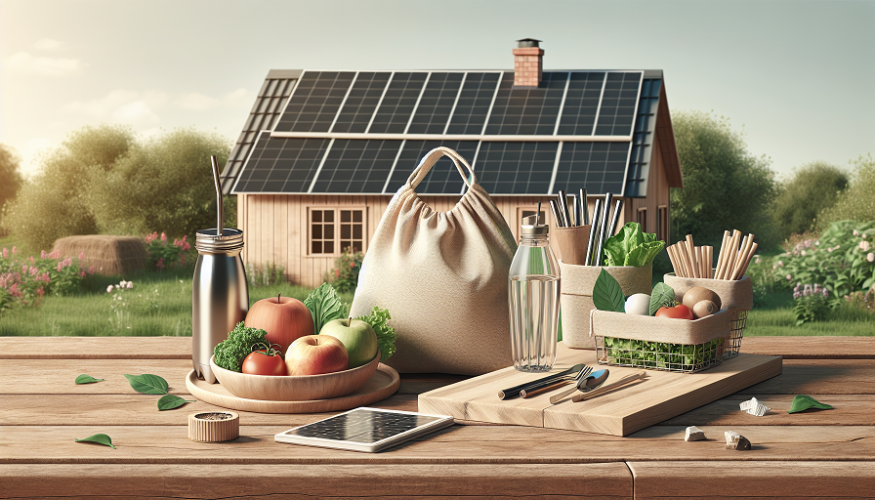Every action we take has an impact on the planet, and in today’s environmentally conscious world, many of us are looking for ways to reduce waste and live more sustainably. Transitioning to a zero-waste lifestyle doesn’t have to be overwhelming. Small, intentional swaps can make a big difference over time—and they’re easier to implement than you might think.
What Does Zero-Waste Mean?
Before diving into the swaps, let’s clarify what “zero-waste” means. A zero-waste lifestyle aims to minimize waste by reusing, recycling, and composting as much as possible. The goal is to send little to no trash to landfills or incinerators. While achieving a completely waste-free life is challenging, adopting zero-waste principles can significantly reduce your environmental footprint.
This philosophy encourages us to rethink our consumption habits and choose durable, reusable products over single-use items. The result? Less waste, lower expenses in the long run, and a healthier planet for future generations.
Simple Zero-Waste Swaps for Everyday Life
Ready to start your zero-waste journey? Here are some easy swaps you can make today that will have a positive impact on the environment without disrupting your daily routine.
Swap Plastic Bags for Reusable Tote Bags
Plastic bags are one of the most common pollutants, often ending up in landfills or oceans. Replacing them with reusable tote bags is one of the simplest and most effective zero-waste swaps. Keep a few sturdy cloth or canvas totes in your car, backpack, or purse so you’re always prepared for a trip to the grocery store or market.
- Why it works: Tote bags are durable, washable, and can last for years.
- Bonus tip: Use mesh produce bags to eliminate plastic waste when shopping for fruits and vegetables.
Ditch Plastic Bottles for a Reusable Water Bottle
Single-use plastic water bottles contribute massively to pollution. A high-quality reusable water bottle, made of stainless steel or glass, is a game-changer. It keeps you hydrated on the go while saving money and reducing waste.
- Why it works: Many reusable bottles are insulated, keeping your beverages hot or cold for hours.
- Bonus tip: Pair your bottle with a water filter at home for clean, eco-friendly hydration.
Replace Disposable Coffee Cups with Reusable Mugs
Takeaway coffee cups often come with plastic linings that make them difficult to recycle. By bringing your own reusable mug to your favorite café, you can enjoy your coffee guilt-free. Many coffee shops even offer discounts for bringing your own cup.
- Why it works: A reusable coffee mug is stylish, customizable, and significantly reduces waste.
- Bonus tip: Choose a collapsible travel mug for convenience and portability.
Use Beeswax Wraps Instead of Plastic Wrap
Plastic wrap is a staple in many kitchens, but it’s single-use and non-recyclable. Beeswax wraps are a fantastic zero-waste alternative for covering bowls, wrapping sandwiches, or storing food. Made with cotton fabric coated in beeswax, they’re reusable, washable, and biodegradable.
- Why it works: Beeswax wraps mold easily to various shapes and are naturally antimicrobial.
- Bonus tip: If you’re vegan, plant-based wax wraps are available too.
Switch to Bar Soap and Shampoo Bars
Liquid soap and shampoo often come in plastic bottles that contribute to waste. Bar soaps and solid shampoo bars are long-lasting, packaging-free, and just as effective as their liquid counterparts. Look for brands that use natural ingredients to avoid harsh chemicals.
- Why it works: Compact and travel-friendly, these bars reduce plastic waste significantly.
- Bonus tip: Invest in a soap dish to keep your bars dry and extend their lifespan.
Opt for Cloth Napkins and Towels Over Paper Products
Paper towels and napkins may seem convenient, but they’re wasteful and unnecessary. Switching to washable cloth alternatives is an easy way to reduce waste and elevate your dining experience.
- Why it works: Cloth napkins are durable and can be reused countless times.
- Bonus tip: Cut up old T-shirts or linens to create your own reusable cleaning rags.
Trade Disposable Razors for a Safety Razor
Disposable razors generate a surprising amount of waste over time. A safety razor, made of metal and designed to last a lifetime, is a smart alternative. Replacement blades are affordable and fully recyclable, making this swap a win for both your wallet and the environment.
- Why it works: Safety razors provide a closer, smoother shave with minimal waste.
- Bonus tip: Take your time learning to use a safety razor to avoid nicks and cuts.
Tips for a Successful Transition to Zero-Waste
Making these swaps is just the beginning of your zero-waste journey. To stay on track, keep these tips in mind:
- Start small: Focus on one or two swaps at a time to avoid feeling overwhelmed.
- Be consistent: Habits take time to build, so stick with your swaps even if it feels challenging at first.
- Educate yourself: Learn about the environmental impact of common items to stay motivated.
- Spread the word: Encourage friends and family to join you in adopting zero-waste practices.
Embracing a zero-waste lifestyle is a journey, not a destination. By making small, intentional swaps, you can significantly reduce your environmental footprint and inspire others to do the same. Whether it’s carrying a reusable water bottle, switching to beeswax wraps, or saying goodbye to plastic bags, every change matters. Start with the swaps that feel most manageable and watch as they transform your habits and your impact on the planet.
